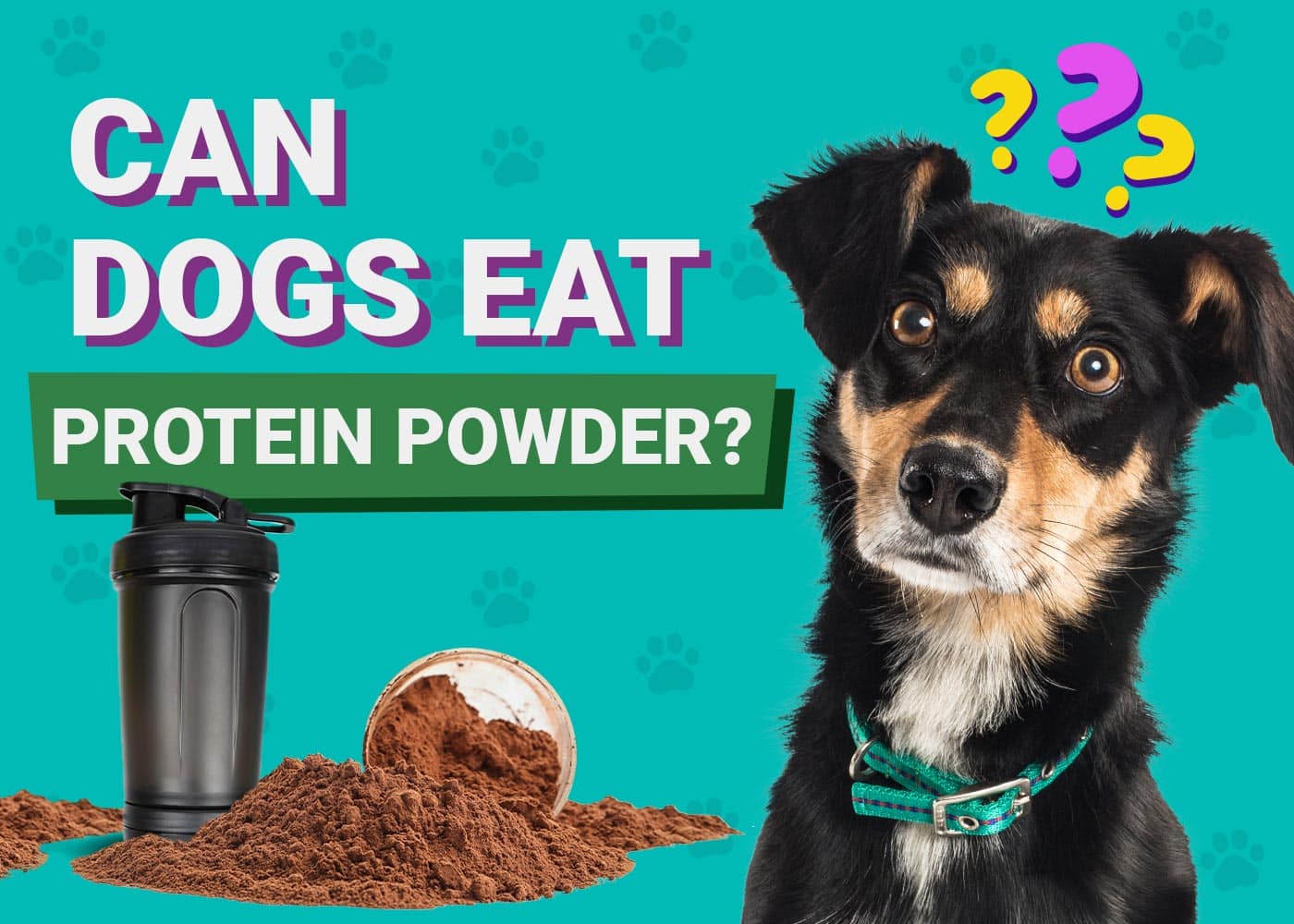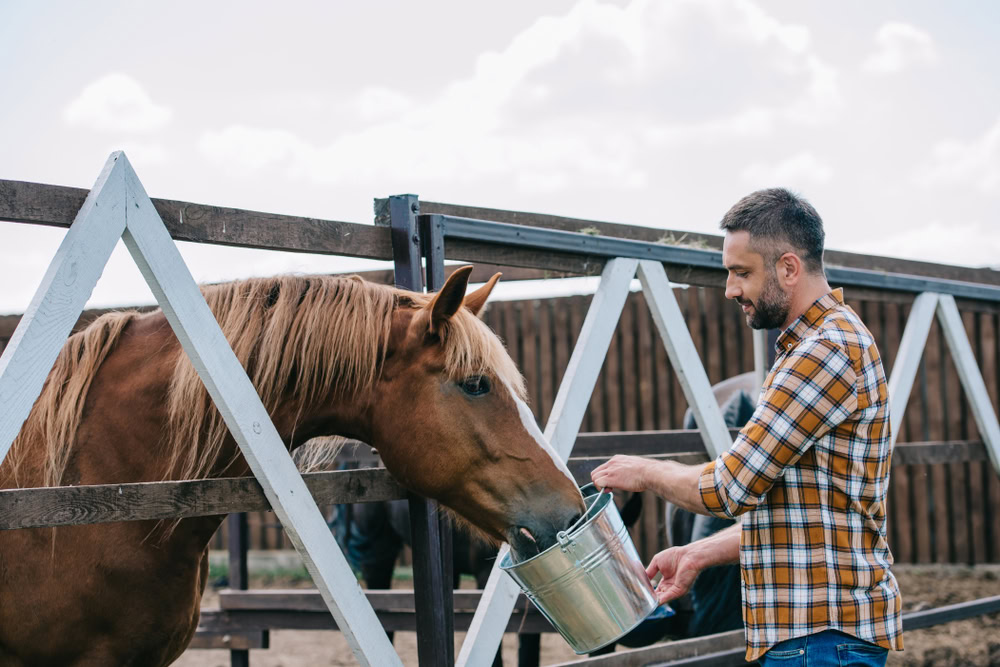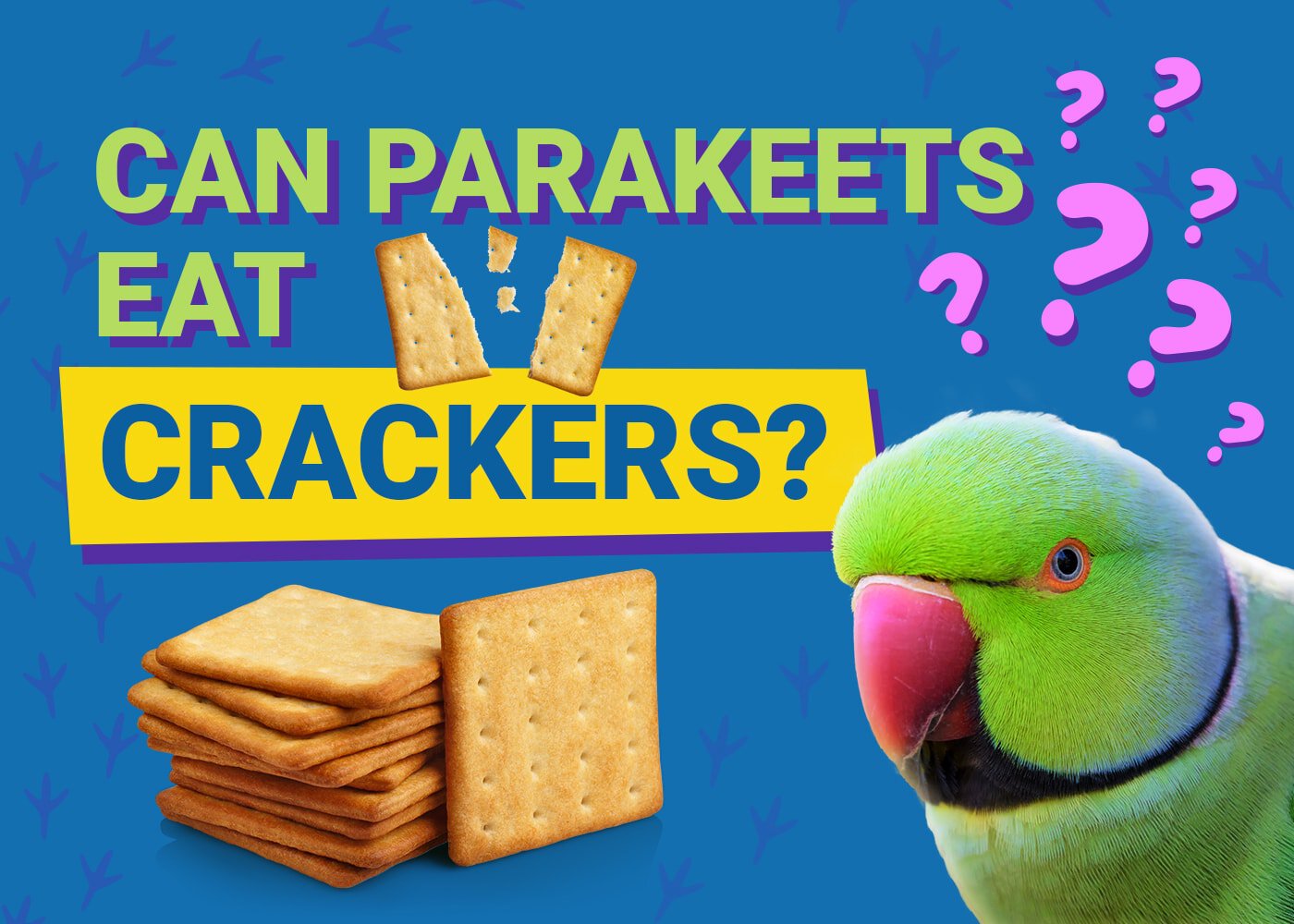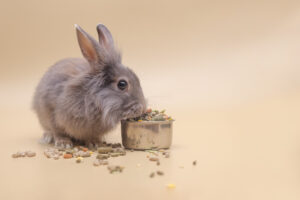
Rabbits are one of the most common domestic pets, yet so few people know much about the nutritional needs of these animals. Despite what Bugs Bunny would have us believe, carrots are not, in fact, the ideal diet.
Rabbits need a combination of high-quality hay, fresh vegetables, and pellets. Choosing the healthiest pellets requires some research and forethought, as not all available options are healthy or even safe for rabbits.
Keep reading to find our reviews of the best rabbit food and pellets on the market today and to learn everything you need to know about proper rabbit nutrition.
Click to Skip Ahead

A Quick Comparison of Our Winners in 2025
| Rating | Image | Product | Details | |
|---|---|---|---|---|
Best Overall
 |
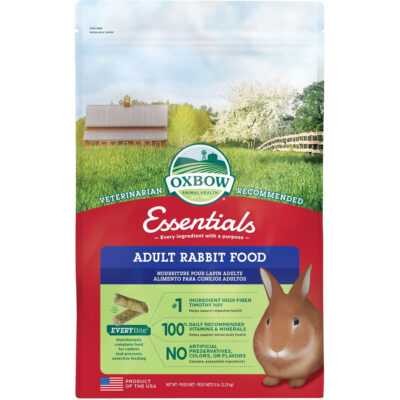 |
Oxbow Essentials Adult Rabbit Food |
|
CHECK PRICE |
Best Value
 |
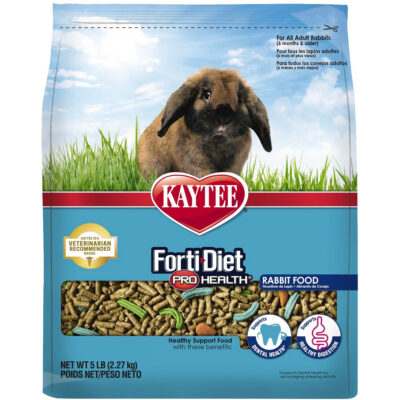 |
Kaytee Forti-Diet Pro Health Adult Rabbit Food |
|
CHECK PRICE |
Premium Choice
 |
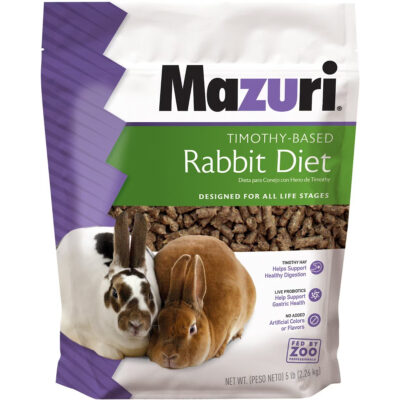 |
Mazuri Timothy-Based Rabbit Food |
|
CHECK PRICE |
|
|
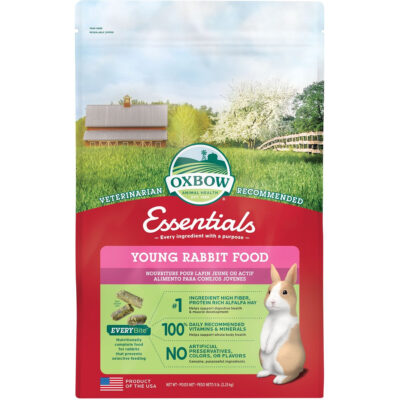 |
Oxbow Essentials Bunny Basics Young Rabbit Food |
|
CHECK PRICE |
|
|
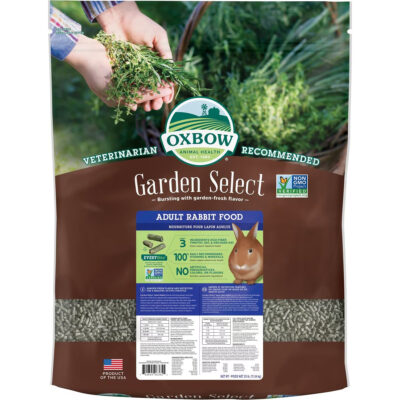 |
Oxbow Garden Select Adult Rabbit Food |
|
CHECK PRICE |
The 10 Best Rabbit Food & Pellets
1. Oxbow Essentials Adult Rabbit Food – Best Overall
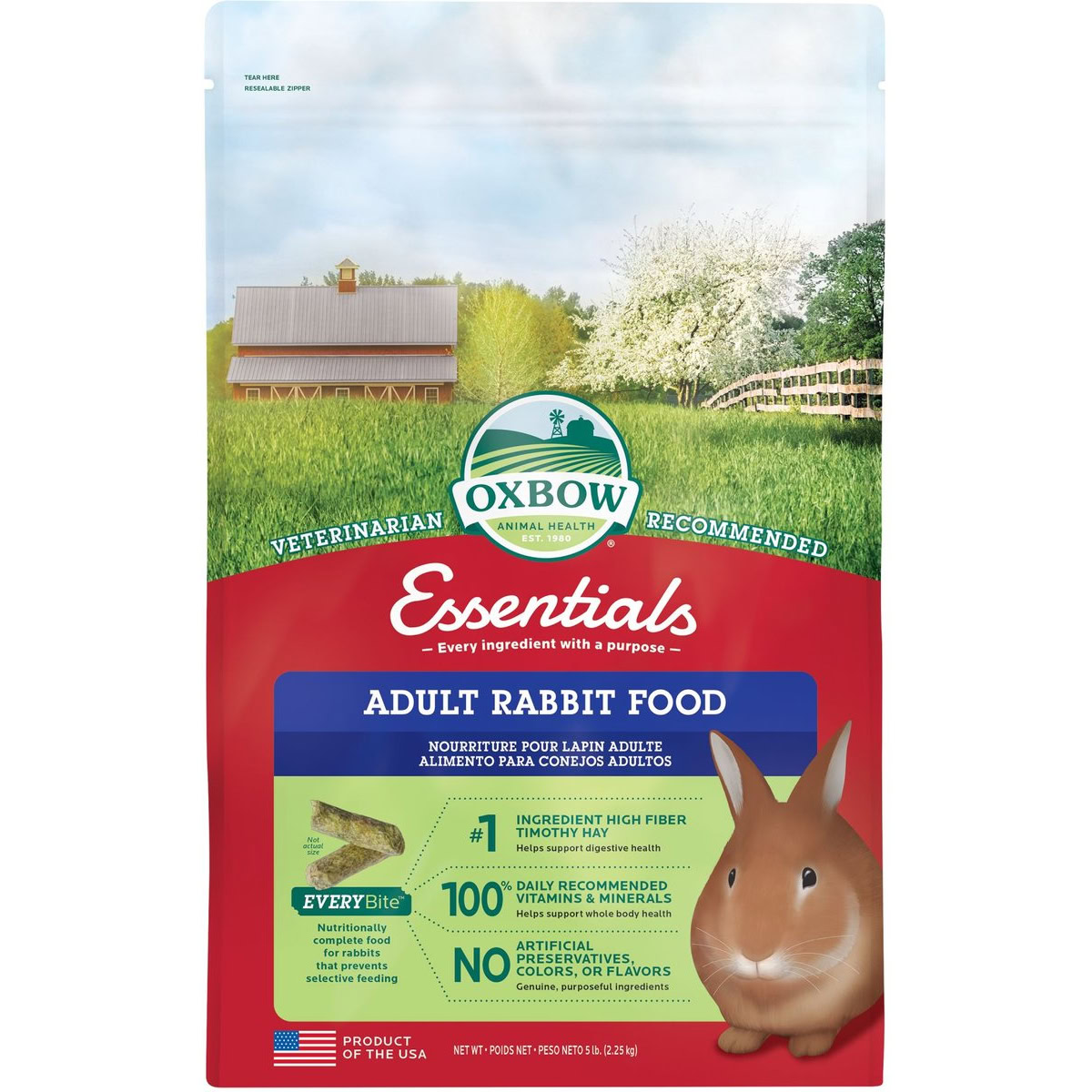
| Main ingredients: | Timothy Grass Meal, Soybean Hulls, Wheat Middlings |
| Fiber: | 25.0% min |
| Protein: | 14.0% min |
| Fat: | 2.0% min |
The Oxbow Essentials Adult Rabbit Food is the best overall rabbit pellet on the market today. It’s made from Timothy grass meal to meet your adult pet’s unique nutritional needs. This high-fiber pellet provides your rabbit with the fiber it needs to maintain a healthy digestive system. It comes in different bag sizes from 5 pounds to 50 pounds, so you can pick a size that suits your colony size. The pellets are uniform in size to prevent selective eating and were specially formulated under the guidance of exotic veterinarians.
The pellets are fragile, breaking easily and turning into crumbly dust.
- High fiber pellet
- Promotes digestive health
- Many bag size options
- Pellets uniform in size
- Formulated by exotic vets
- Pellets can crumble in mishandled bags
2. Kaytee Forti-Diet Pro Health Adult Rabbit Food – Best Value
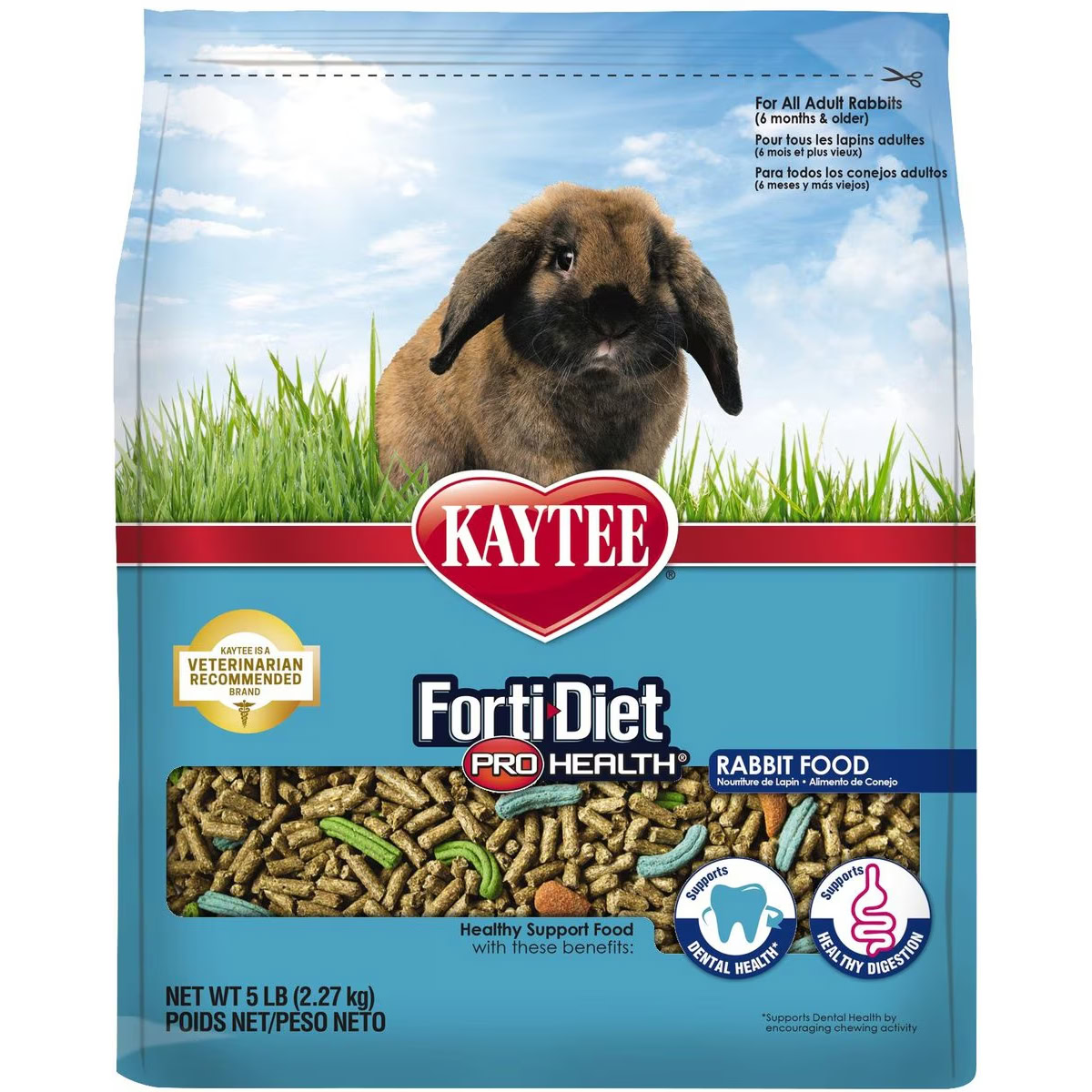
| Main ingredients: | Sun-Cured Timothy Grass Hay, Sun-Cured Alfalfa Meal, Ground Oats |
| Fiber: | 18.0% min |
| Protein: | 12.0% min |
| Fat: | 2.5% min |
Rabbit owners on a budget will love the Kaytee Forti-Diet Pro Health Adult Rabbit Food as it provides consumers with the best rabbit pellet for the money. This food is designed to be highly palatable for rabbits, encouraging them to graze on their pellets throughout the day. The texture is easy to eat and digest. The food is made without artificial preservatives and is fortified with omega-3 fatty acids to support brain, heart, and eye function. In addition, the pellets provide your rabbit with a dose of protein from oats and wheat.
This food does contain small colorful pieces, which may promote selective eating.
- Affordable price
- Highly palatable
- Easy-to-eat texture
- Fortified with fatty acids
- May promote selective eating
3. Mazuri Timothy-Based Rabbit Food – Premium Choice
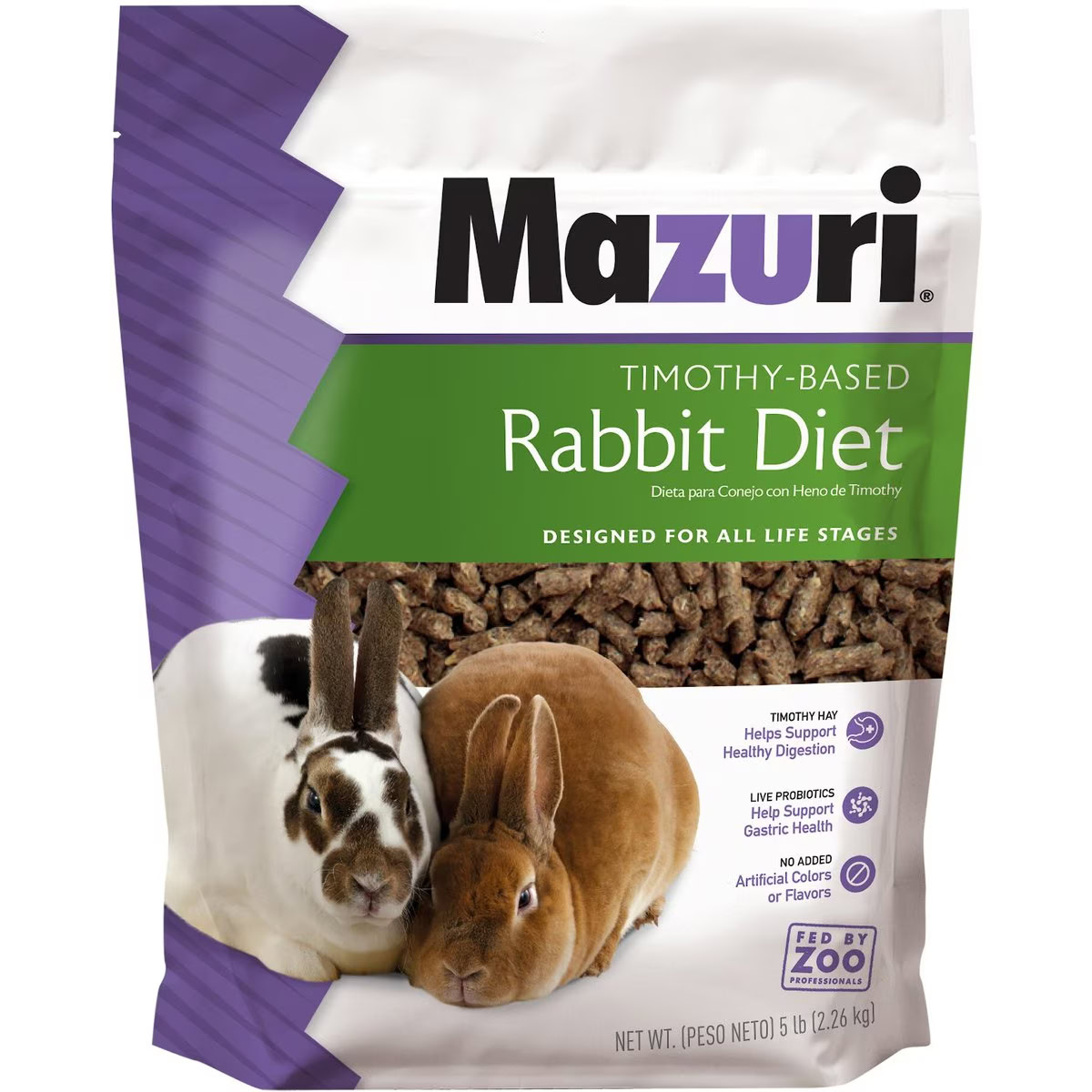
| Main ingredients: | Ground Timothy Hay, Ground Soybean Hulls, Wheat Middlings |
| Fiber: | 18.0% min |
| Protein: | 14.0% min |
| Fat: | 1.5% min |
Though the Mazuri Timothy-Based Rabbit Food is a bit on the pricey end, it comes in a 25-pound bag, so the value for the cost is there. These pellets are nutritionally complete, so you don’t need to provide any further supplementation to your rabbit’s diet. They’re high in fiber and fortified with probiotics to further promote gastrointestinal health. In addition, it contains flax seeds as a source of fatty acids and yucca schidigera, which may promote nutrient digestibility.
- Nutritionally complete pellets
- High in fiber
- Probiotics to boost digestive health
- Source of fatty acids
- Expensive price
4. Oxbow Essentials Bunny Basics Young Rabbit Food
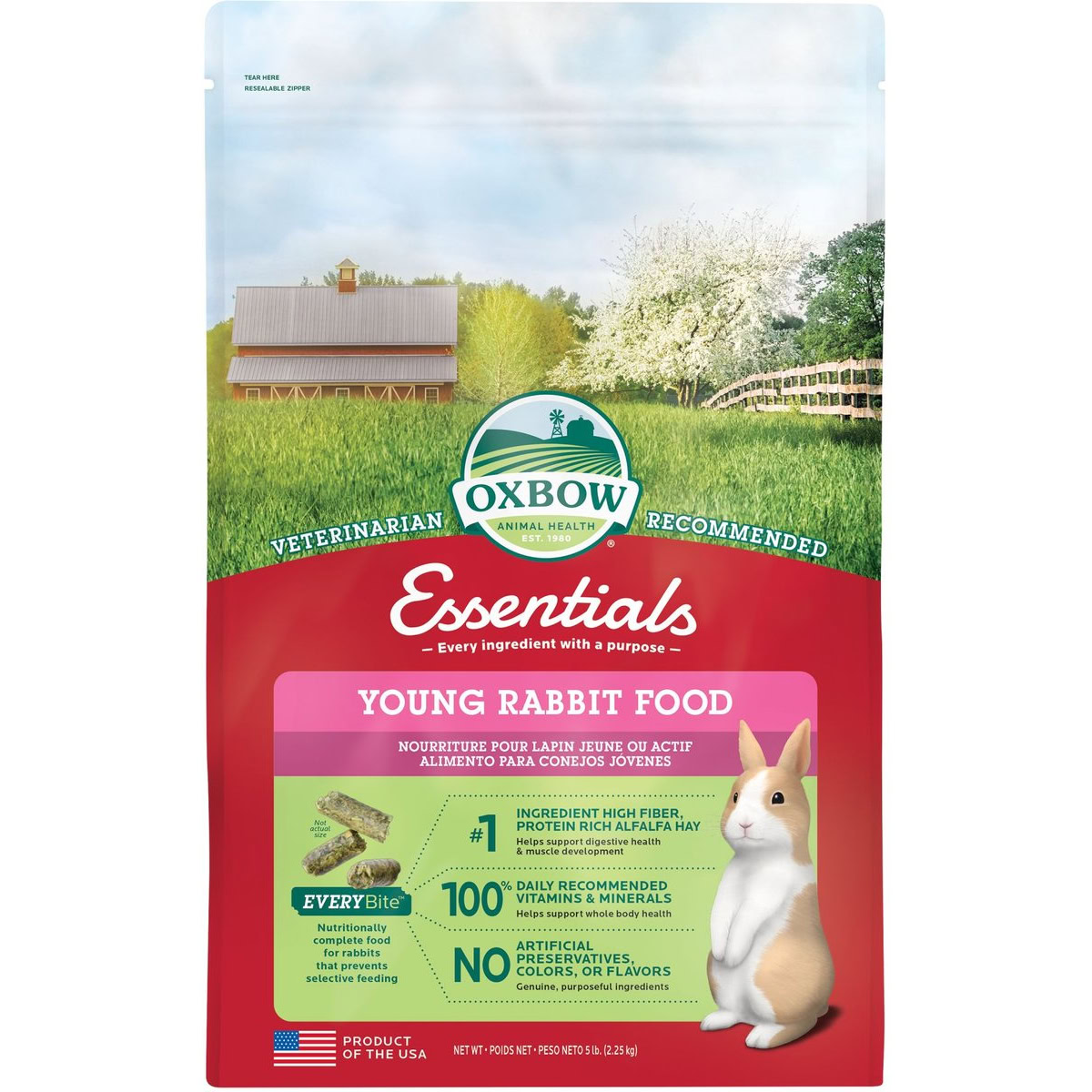
| Main ingredients: | Alfalfa Meal, Soybean Hulls, Wheat Middlings |
| Fiber: | 22.0% min |
| Protein: | 15.0% min |
| Fat: | 2.5% min |
If your rabbit is still a bunny, you should choose a pellet formula specifically designed for young pets in mind. The Oxbow Essentials Bunny Basics Young Rabbit Food was created to meet the unique dietary needs of young pets. This formula is also optimal if you have an older rabbit that needs help maintaining its weight. It’s made with alfalfa hay to provide a balanced source of amino acids and protein for the growth of your young rabbit. The pellets have a good texture and don’t produce powder like similar rabbit foods.
Alfalfa hay is high in fats and proteins, which makes it ideal for baby rabbits but not the best for healthy adults. In addition, this hay type is high in calcium, which can be dangerous to adults if fed in excess.
The bag leaves something to be desired as it rips easily, making the food inside stale unless you move it to another container.
- Designed specifically for babies
- Source of amino acids
- Doesn’t produce much powder
- Optimal for older rabbits not maintaining weight
- Bag rips easily
5. Oxbow Garden Select Adult Rabbit Food
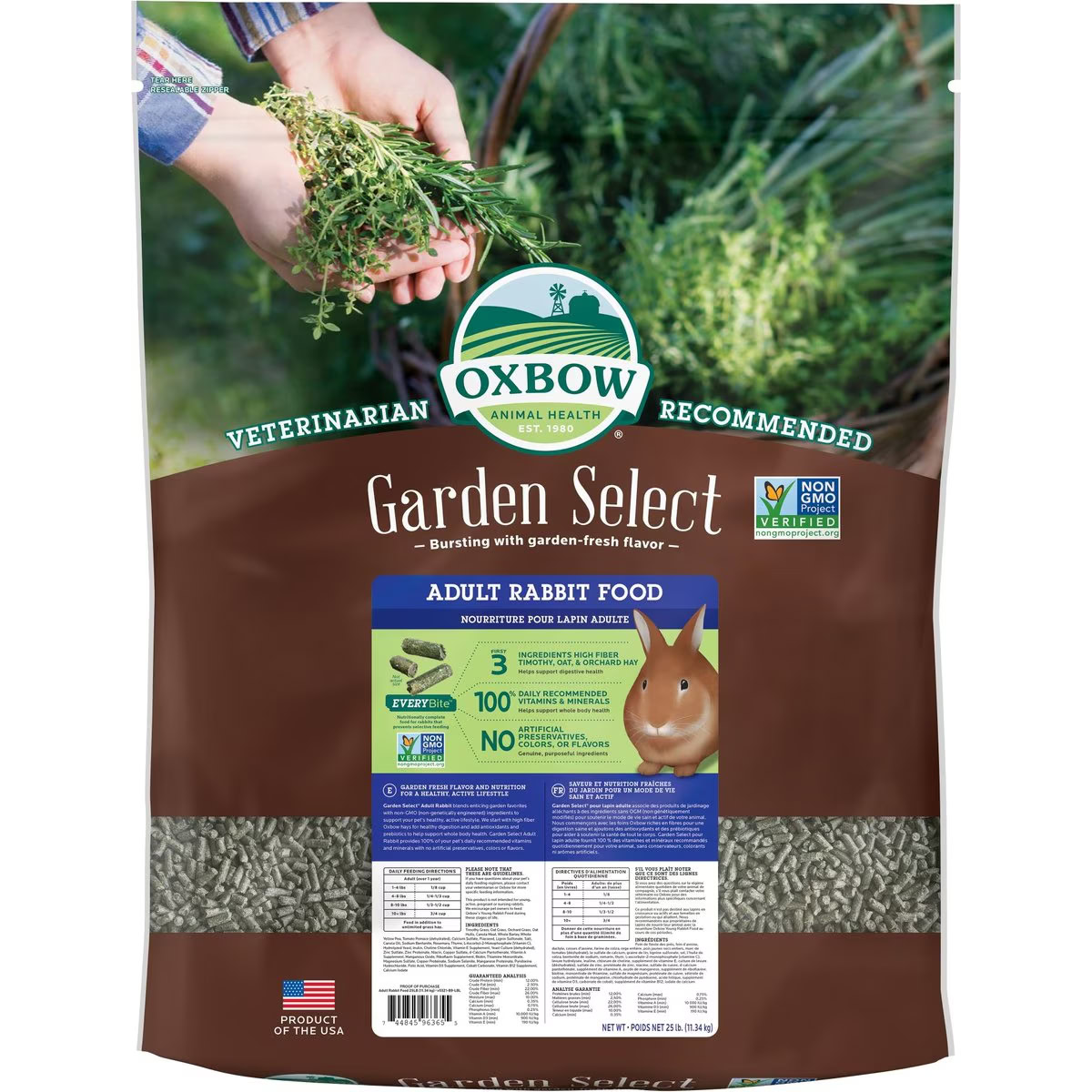
| Main ingredients: | Timothy Grass, Oat Grass, Orchard Grass |
| Fiber: | 22.0% min |
| Protein: | 12.0% min |
| Fat: | 2.5% min |
The Oxbow brand is a winner in the rabbit food market with their Oxbow Garden Select Adult Rabbit Food being the third of their products on our list. These pellets are different from the others from the company on our list as they contain natural hardened ingredients to help promote a foraging environment for your pet. This includes veggies and herbs like yellow peas, tomato, and thyme. No soy is in this recipe, which can be a controversial ingredient in the rabbit food market. Additionally, the veggies are in the pellets themselves and not added separately to discourage selective eating.
This food isn’t certified organic but is made with non-GMO ingredients. It is quite pricey when compared to Oxbow’s other offerings.
- Discourages selective eating
- Promotes foraging
- No soy
- Non-GMO ingredients
- Not certified organic
- Expensive
6. Science Selective Adult Rabbit Food
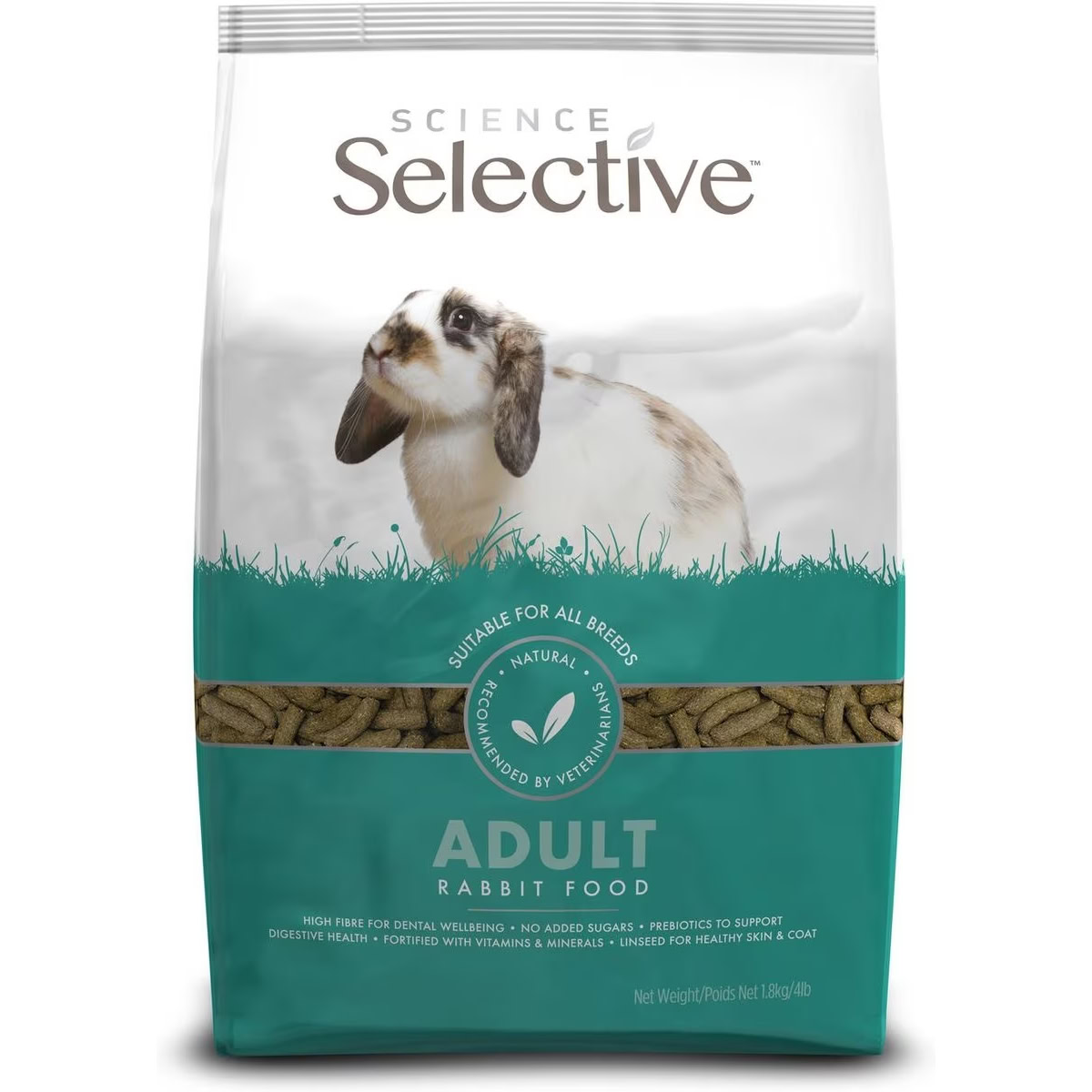
| Main ingredients: | Alfalfa Meal, Soybean Hulls, Wheat |
| Fiber: | 25.0% min |
| Protein: | 14.0% min |
| Fat: | 4.0% min |
Science Selective Adult Rabbit Food is a high-fiber food that balances calcium and phosphorus to support your pet’s health. The formula is highly palatable and contains linseed oil to promote skin and coat health. In addition to being high in fiber, this recipe is formulated with prebiotics to further support digestive health. The company doesn’t add any sugars to the formula.
Though this food is marketed toward adults, it may be better suited for younger rabbits. Since it is made with high-calcium alfalfa hay, it isn’t the optimal option for fully-grown rabbits.
- Palatable formula
- Linseed oil to promote skin and coat health
- High in fiber
- Prebiotics for digestive health
- Not optimal for adult rabbits
- High calcium
7. Small Pet Select Timothy Based Rabbit Food
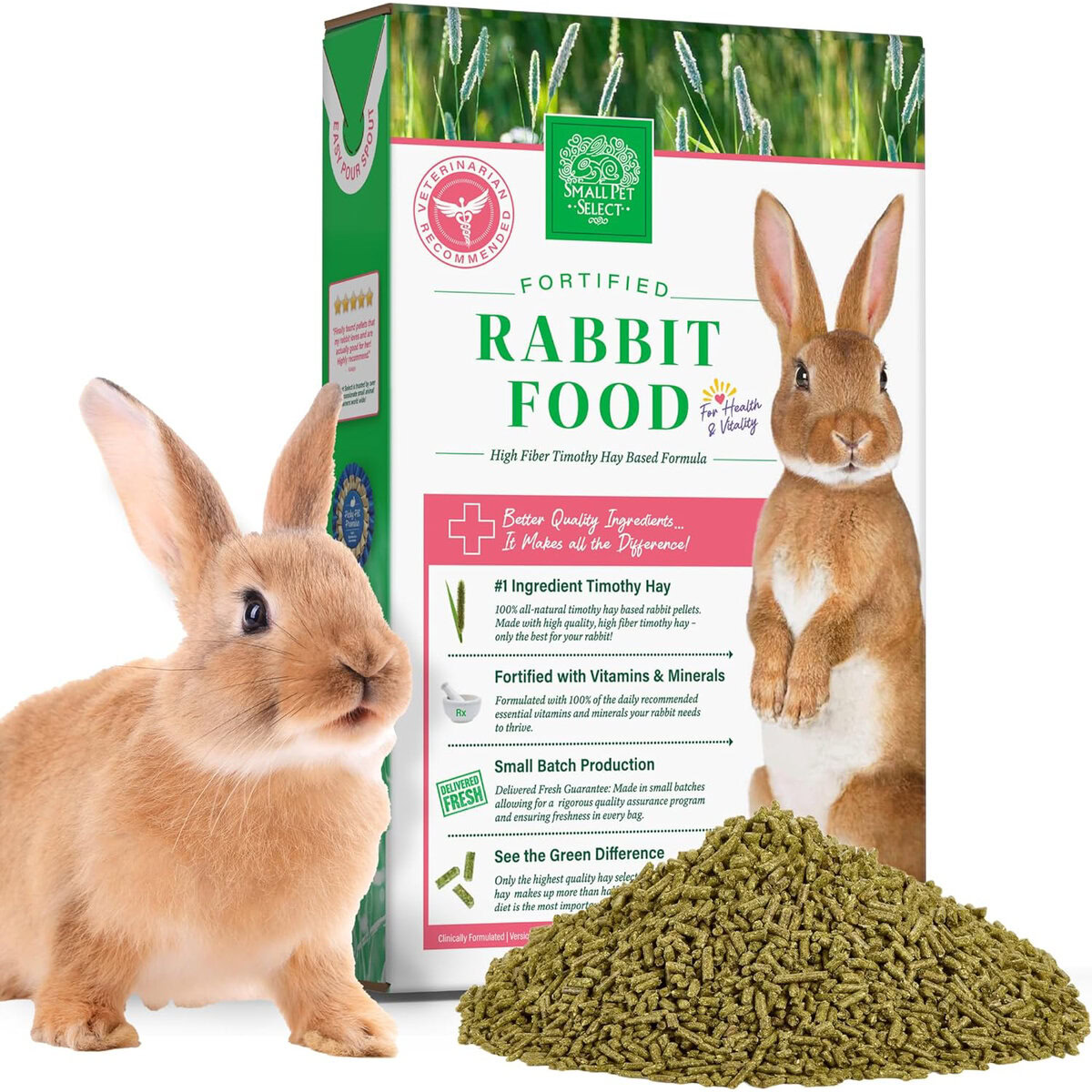
| Main ingredients: | Timothy Hay, Soybean Hulls, Sodium Bentonite |
| Fiber: | 25.0% min |
| Protein: | 14.0% min |
| Fat: | 2.0% min |
Small Pet Select Timothy Based Rabbit Food is a high-fiber formula that is milled in small batches to maintain optimal freshness and quality. It’s made in America by a small business to provide peace of mind over ingredient sourcing. It is non-GMO and fortified with vitamins and minerals your rabbit needs to thrive.
Please note that the online listing may be slightly misleading as it claims to be made of 100% Timothy hay and no other ingredients. However, when presented with the bag of food, you will see a long list of ingredients aside from Timothy hay. This isn’t the fault of the company, but instead, the online manufacturer who carries their products.
There have been some reports of rogue corn pieces in some of the bags.
- High fiber
- Made in small batches
- Made in America
- Non-GMO
- Misleading online listing
- Corn pieces in some bags
8. Kaytee Timothy Complete Pelleted Rabbit Food
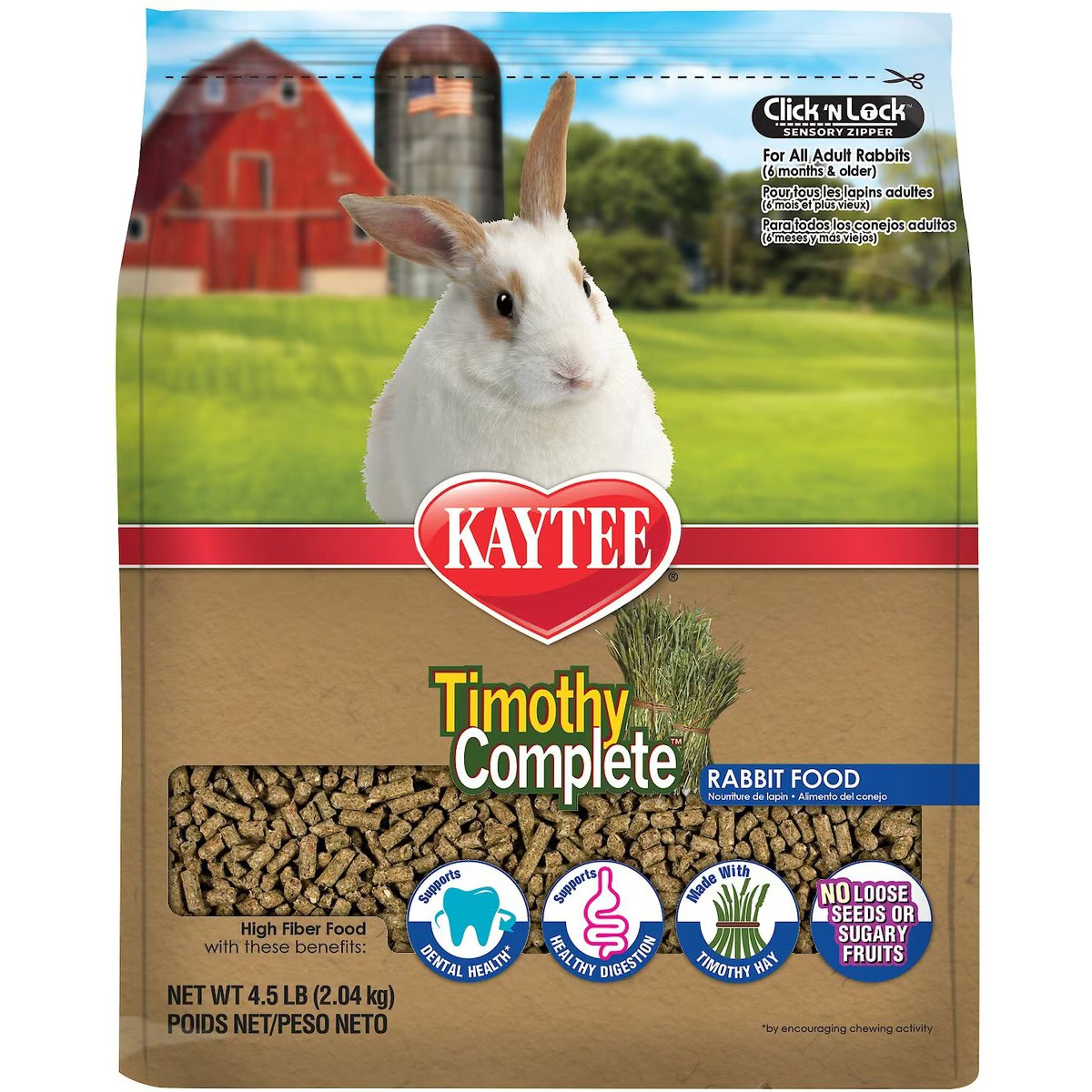
| Main ingredients: | Sun-Cured Timothy Grass Hay, Soybean Hulls, Dehulled Soybean Meal |
| Fiber: | 20.0% min |
| Protein: | 13.0% min |
| Fat: | 1.5% min |
The Kaytee Timothy Complete Pelleted Rabbit Food is made from hand-selected Timothy hay and is fortified with vitamins and minerals. The pellets are high in fiber, prebiotics, and probiotics to promote digestive health. It doesn’t contain any seeds or sugary fruits, so you don’t need to worry about your rabbit selectively eating its pellets.
This food is softer than the other pellets on our list, resulting in crumbly and dusty bits at the bottom of the bag. In addition, some consumers report that the food smells funny, which can be off-putting to you and your rabbit.
- Contains probiotics and prebiotics
- No seeds or fruit pieces
- Doesn’t promote selective eating
- Hand-selected hay for optimal quality
- Can be crumbly and dusty
- Some bags smell off
9. Sherwood Pet Health Timothy Pellet Adult Rabbit Food
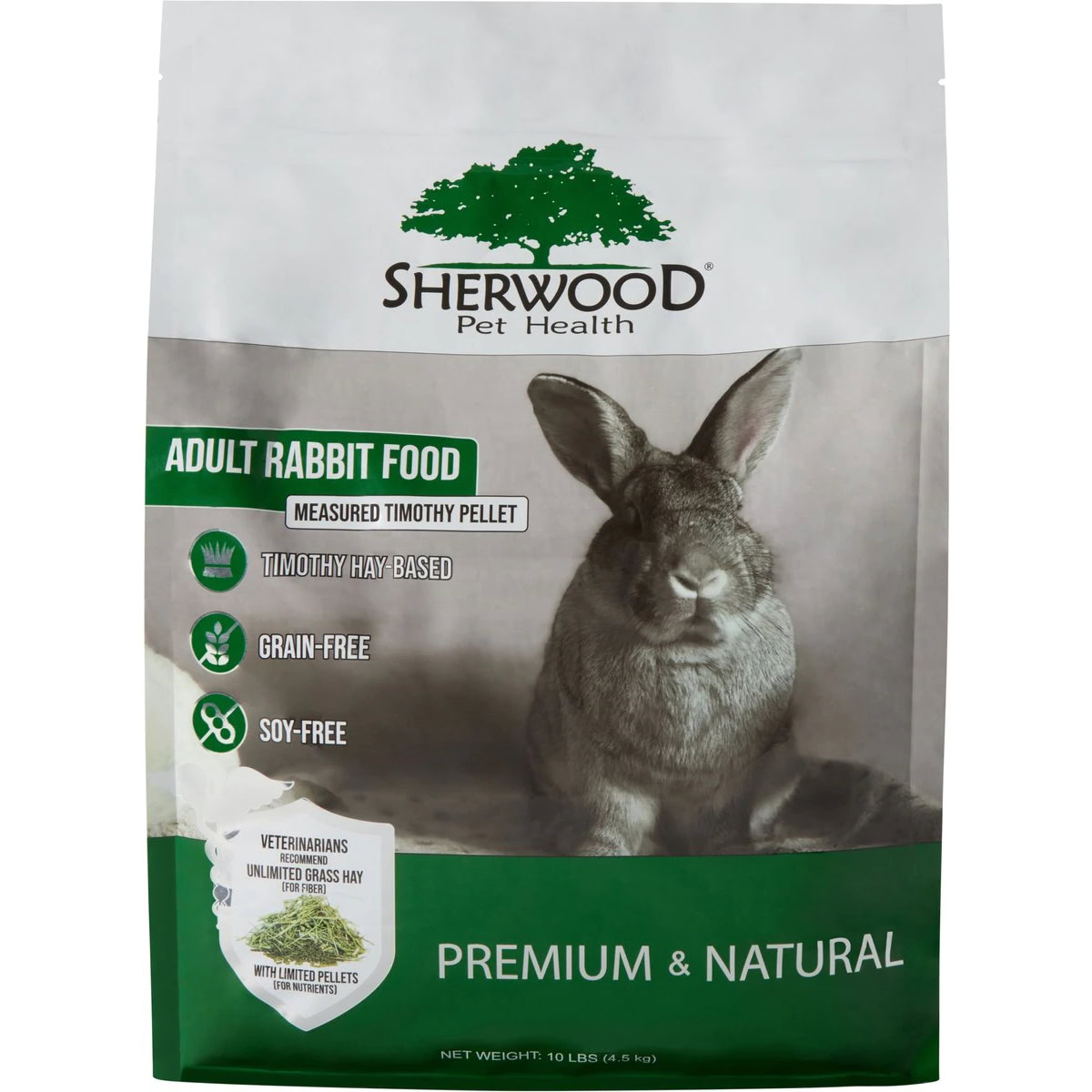
| Main ingredients: | Timothy Hay, Safflower Meal, Whole Flax Seed |
| Fiber: | 24.0% min |
| Protein: | 12.0% min |
| Fat: | 6.5% min |
The Sherwood Pet Health Timothy Pellet Adult Rabbit Food is a pricey option free of grains, soy, and molasses. Since there are no grain by-products, the company uses safflower and flax to provide a dose of healthy fats and high-quality protein. It is high in fiber to support your pet’s digestive health. The pellets smell very fresh, which may make them more palatable to your pet.
The pellets are very small, making them difficult for some rabbits to eat.
- Fresh smelling
- No grains or molasses
- Smelly in a way rabbit’s like
- Expensive price
- High in fat
- Small pellets can be hard to eat
10. Vitakraft VitaSmart Complete Nutrition Natural Foraging Blend Rabbit Food
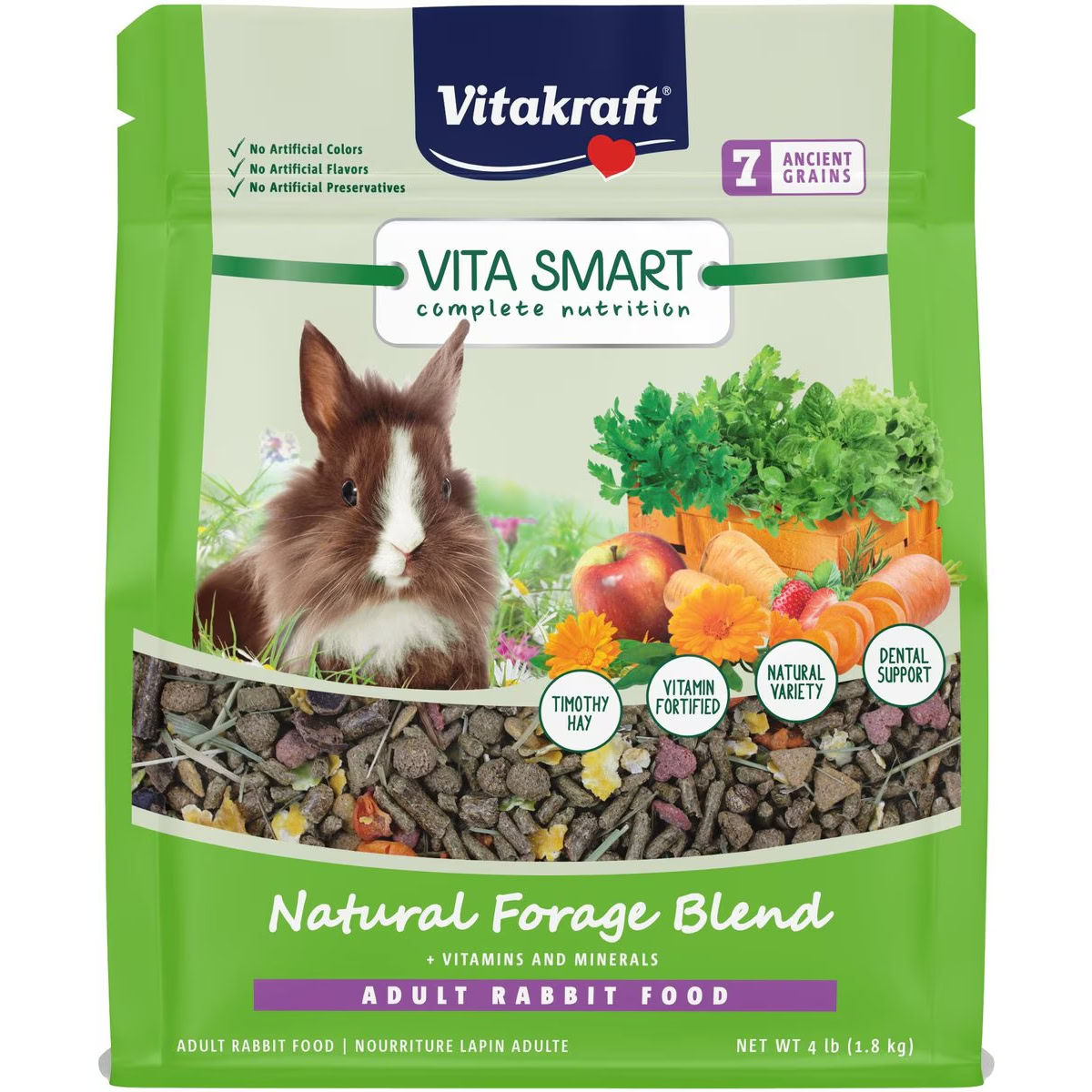
| Main ingredients: | Ground Timothy Grass Hay, Soybean Hulls, Dehulled Soybean Meal |
| Fiber: | 18.0% min |
| Protein: | 14.0% min |
| Fat: | 2.0% min |
The Vitakraft VitaSmart Complete Nutrition Natural Foraging Blend Rabbit Food features a blend of high-quality Timothy hay and fruits and vegetables to encourage foraging behavior and provide your rabbit with the vitamins and minerals it needs to thrive. The manufacturer adds fatty acids, antioxidants, and other vitamins to promote immune system health. In addition, the pellets have varying textures and long fiber strands to promote dental health.
The fruit and vegetable pieces may promote selective eating, and the pellets can become crumbly and dusty. This formula contains alfalfa, which may be dangerous for healthy adult rabbits.
- Encourages foraging
- Contains fatty acids and antioxidants
- Varying textures on pellets
- May promote selective eating
- Pellets are crumbly at times
- Alfalfa can be bad for adult rabbits

Buyer’s Guide: How to Choose the Best Rabbit Foods & Pellets
Nutrient Requirements for Rabbits
Before you can choose the perfect food for your pet, you need to know a bit more about the nutritional requirements of rabbits. As with all living things, rabbits have nutrient requirements to promote optimal health. These nutrients include protein, carbohydrates, fat, and water.

Protein
Rabbits have a crude protein requirement of 12 % to 18% on a dry matter (DM) basis. The exact protein your rabbit needs will depend on its life stage. Those gestating or lactating will need a higher protein intake closer to the 18% range. Those in the growth stage will need between 15% and 18%, and those in the maintenance stage (most adults) will be on the low end at around 13%.
Carbohydrates and Fiber
As with humans, carbohydrates are a main source of energy for rabbits. However, we differ from our rabbit counterparts in that most of their carb requirements need to come in the form of fiber. Your pet will get its fiber needs met through ingesting hay (more about hay later).
Fat
In addition to using carbohydrates as energy, rabbits also use fat as an energy source. Fat is a necessary component of their diet because it helps them absorb fat-soluble vitamins and it adds an element of palatability to their pellets. A pellet containing between 2% and 5% fat (DM) is ideal.
Water
Rabbits drink much more water than their canine or feline counterparts. They tend to consume water at a rate of around 120 ml per kilogram of body weight per day, approximately twice as much as a cat or dog. Their higher water consumption is due to their unique gastrointestinal tract.
Fresh water needs to be available 24 hours a day. How you serve your rabbit its water will depend on your habitat set-up and your pet’s preferences. Some owners like using water bowls, while others prefer sipper bottles.
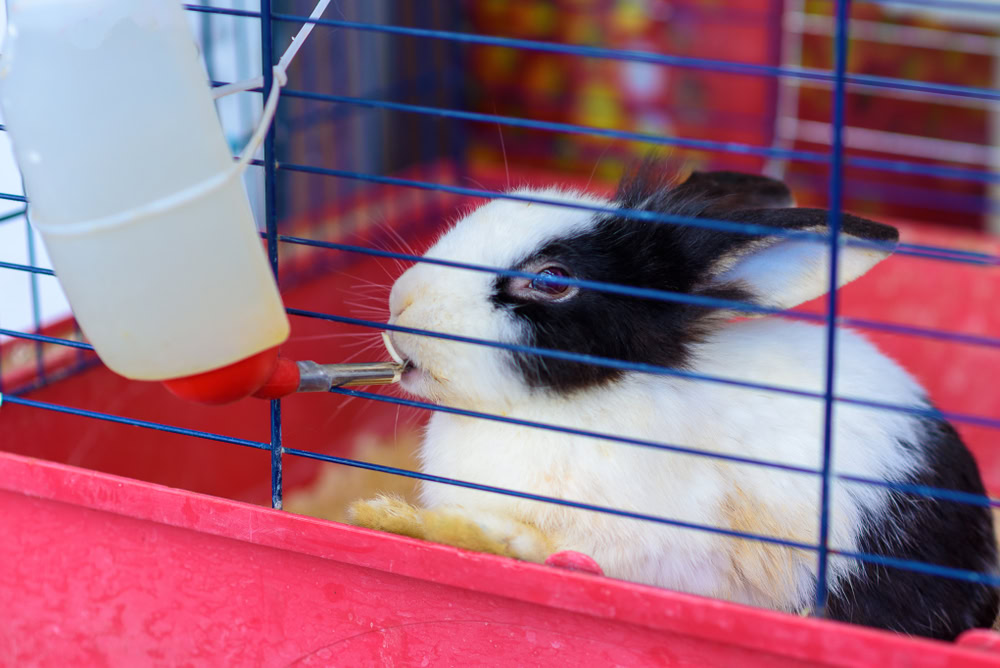
How Much Should I Feed My Rabbit?
You shouldn’t allow your adult rabbit unlimited access to pellets. They will need to be rationed to prevent overeating and obesity. In addition, rabbits that consume too many pellets may be less likely to eat hay, which can cause many issues. Pellets should therefore be offered as a small, measured component of your pet’s daily diet.
According to VCA Animal Hospitals, pellets can be offered at around 1/8 to ¼ cup per five pounds of body weight.
A Rabbit’s Relationship With Hay
Our blog focused primarily on rabbit food and pellet options, but we felt it important to touch on another essential aspect of rabbit nutrition: hay. While it’s true that the pellets on our list are made with hay, it’s still necessary to provide your pet with actual hay, too.
- Wearing down the teeth that would otherwise continue growing
- Mimicking the diet a rabbit would eat in the wild
- Providing much fiber to keep the digestive tract operating as it should
- Providing environmental enrichment
- Promoting good litter box habits
Grass hays like Timothy, orchard grass, and Bermuda grass are the best option for your rabbit. You can find hay at your local pet store, veterinary office, feed stores, or even from a local farmer. The key is to find good quality hay. Look for green, fragrant options with a good mix of stalk and soft parts. Avoid hay that’s dusty, moldy, stinky, or brown. Not only will this not taste good to your rabbit, but it could be dangerous, too.
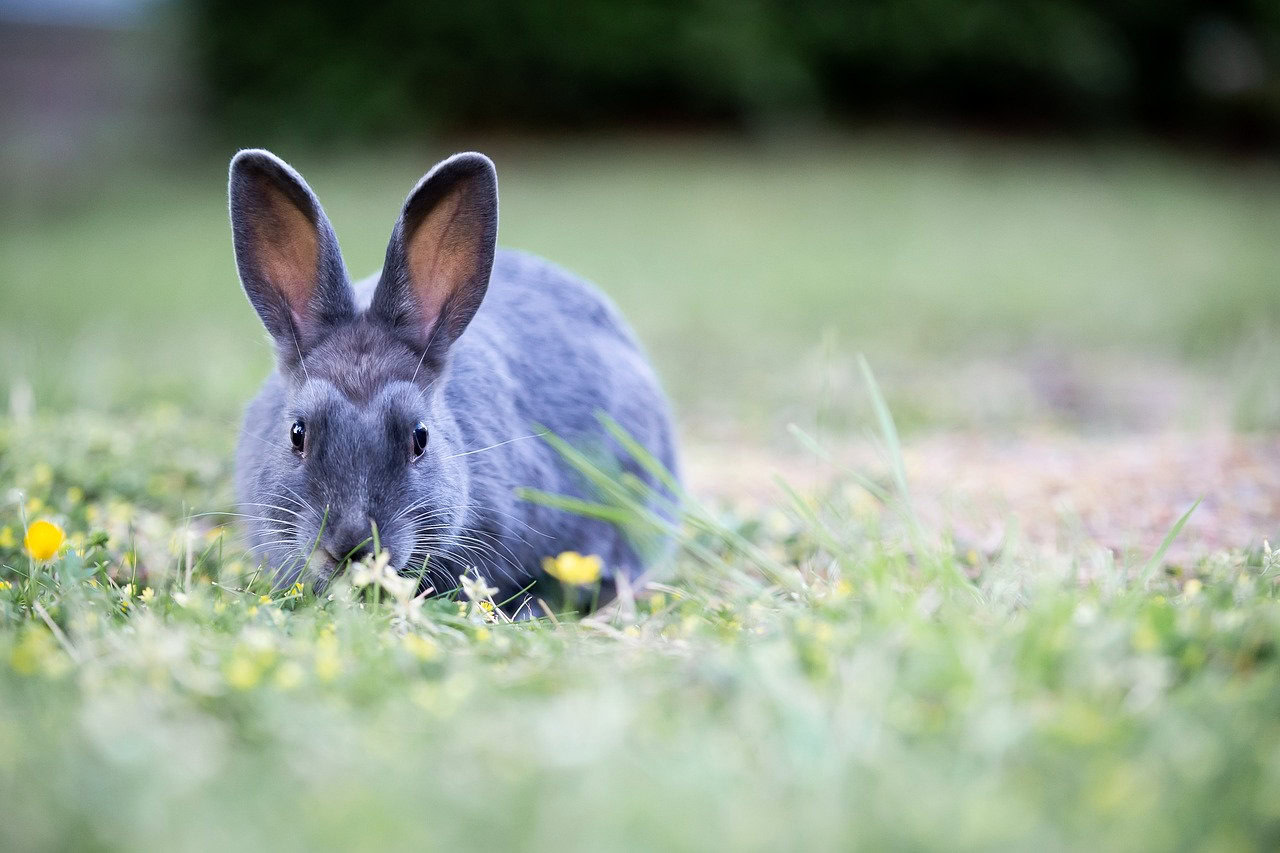
What About Alfalfa Hay?
You may have noticed a few mentions of alfalfa hay in our article and may wonder what the deal is with it.
Alfalfa hay and pellets containing alfalfa are typically only recommended during the growth phase, though a vet may also recommend it when a doe is pregnant and lactating. Adult rabbits do not have the same nutritional needs as those still growing. Your baby rabbit should switch to an adult diet between seven and 12 months.
What Is the Ideal Rabbit Diet?
Now that you know more about your rabbit’s dietary needs, you’re probably wondering how it will all look in action.
Around 85% of your pet’s diet should consist of grass and hay. Therefore, it should be provided in unlimited amounts. Alfalfa hay should be avoided unless your rabbit is young, pregnant, or lactating. After that, you may offer it very occasionally as a treat.
Leafy greens and other vegetables should account for 10% of your rabbit’s diet. Fruit and carrots should only be offered occasionally as they’re high in sugar.
Finally, rabbit pellets will account for 5% of your pet’s diet.
How We Determined This List of Best Rabbit Food & Pellets
All the rabbit food & pellets reviewed in this article were chosen by our writers, editors, and team of experienced veterinary professionals to ensure that they are safe and meet the care needs of your pet. When choosing which rabbit food & pellets to feature, we took into account brand reputation, personal and hands-on experience, reviews from other customers, and of course, feedback from our beloved pets, to make sure to bring you only the best of the best. We at PangoVet want to give you only the best products to choose from in our reviews, to ensure that they meet your pets’ needs for optimal health and well-being.
Why Trust PangoVet?
We are a team of experienced veterinarians, writers, and editors who are pet owners ourselves, so we understand how important your pets and the products they use and consume are to you. Whether you are caring for a furry, scaly, or feathered friend, we make sure that you have honest and unbiased reviews of the top rabbit food & pellets on the market, so you can make an informed decision.

Conclusion
For the best rabbit pellet, we recommend Oxbow Essentials Adult Rabbit Food, which is healthy, high in fiber, and highly palatable. We recommend Kaytee Forti-Diet Pro Health Adult Rabbit Food for pet owners on a budget as it is an affordable option that’s easy to eat and fortified with fatty acids. Mazuri Timothy-Based Rabbit Food is more costly but the quality is worth the extra few dollars.
Rabbit nutrition doesn’t have to be complex. We hope our reviews have helped shed some light on your pet’s nutritional needs so you can make an informed buying decision.
Featured Image Credit: Kristina Savelieva, Shutterstock





